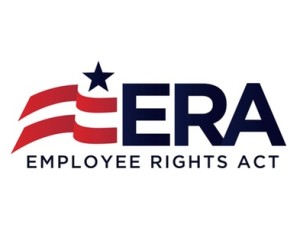 The Employee Rights Act (ERA), labor legislation reintroduced by Sen. Orrin Hatch (R-UT) and Rep. Tom Price (R-GA), is gaining traction on Capitol Hill—and breaking its own records along the way. The ERA is now co-sponsored by 144 members of the 114th Congress, including 29 senators. That surpasses the previous high of 137 co-sponsors when the bill was reintroduced in the 113th Congress.
The Employee Rights Act (ERA), labor legislation reintroduced by Sen. Orrin Hatch (R-UT) and Rep. Tom Price (R-GA), is gaining traction on Capitol Hill—and breaking its own records along the way. The ERA is now co-sponsored by 144 members of the 114th Congress, including 29 senators. That surpasses the previous high of 137 co-sponsors when the bill was reintroduced in the 113th Congress.
Considering it is also supported by 80 percent of Americans—union households included—the ERA is one of the most popular bills in Washington, D.C.
It’s easy to understand why. As we’ve mentioned before, American labor law hasn’t been substantially updated since the 1940s, leaving employees to labor under outdated workplace rules that favor union bosses instead of the rank-and-file. For example, employees still aren’t guaranteed secret ballot elections when they’re mulling union representation. Labor organizers often circumvent the democratic process by using publicly staged “card check” procedures. These public spectacles supplant a private vote and leave employees (and employers) vulnerable to bullying and harassment—which further tilts the scales in favor of Big Labor.
The ERA would fix the problem by requiring secret ballot union elections and (finally) criminalizing union violence at the federal level. It would also prevent union bosses from spending millions of dollars on left-wing politics without obtaining affirmative approval from their members beforehand. Roughly 40 percent of union households vote Republican, yet more than 90 percent of union dollars support the Democratic Party and closely aligned special interest groups. America’s major unions spent nearly $420 million on liberal causes from 2012 to 2014 alone, forcing many union members to support a political agenda they don’t even believe in.
Employees deserve better. Congress is now answering their call.



